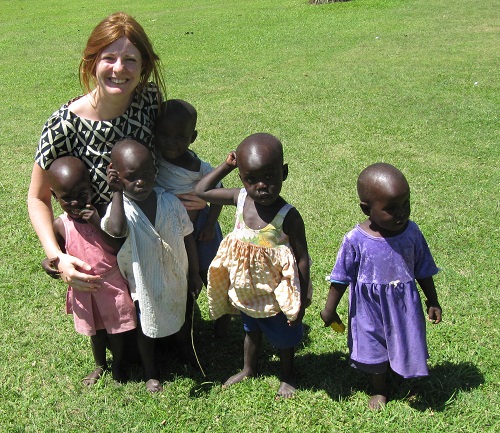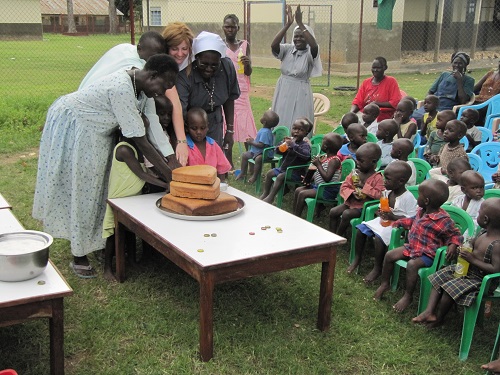Accountancy Ireland on volunteering in Africa: Clare's story04.04.2013

Click here for the original article.
In October last year, Chartered Accountant Clare Keaveny updated her blog, http://clarestalesofuganda. wordpress.com “Life is as entertaining here as ever,” she wrote. “My days are spent working on the accounting systems and playing with the kids. I obviously enjoy one of those things a lot more than the other! Having said that, the work I am doing continues to be very interesting. In the last week, it has mainly involved preparing the budget for 2013. In order to do that we had to look at the costs of the last year and try to estimate how much money is needed next year. It was a depressing, sobering job. In Uganda, there is incredible inflation of prices. In Kampala, the capital, prices do not change as frequently but here in the North West of the country, prices change daily. Currently, there are nearly 20 babies in the home and they are very expensive to feed. In comparison to the price of ther goods, milk for babies is so expensive. The shops know that this is a necessity and price accordingly. The amount of money spent by the Home on milk alone is quite startling but it is due to constant price increases. Soon, the situation will be that the Home cannot afford to take on any new babies as they are just too expensive.”
Clare trained as a Chartered Accountant with KPMG Dublin and after nearly four years of auditing insurance companies and funds, she decided to volunteer as an accountant with AfID (www.afid.org.uk), an organisation that specialises in sending accountancy and finance people to work with local community projects around the world. Clare is currently based in Moyo, a small town in Northern Uganda which is west of the River Nile and close to the South Sudan border. She works at the Moyo Babies Home and Redeemer Childrens Home both of which are run by Sacred Heart nuns. “Ugandans are very religious people and as I am effectively living with nuns, religion is a big part of life here in the Home,” Clare explains, dding that even the Home’s accountant Vuni Henry Alfred is a member of the Church choir and, despite Clare’s protestations that she cannot sing, insisted that she should also join the choir. When it came to accounting, Clare admits to being nervous at first about what her role would involve. “I have never worked for a charity so I really wasn’t sure if I was going to be able to help at all. Thankfully, AfID and the previous volunteers based in the Babies Home had me well prepped for the work I would have to do. So, I came here with a good understanding of what the last volunteers had done and suggestions for what I should work on.”
“My first day of proper work was spent with Vuni Henry Alfred trying to get a better idea of how he manages the accounting system of the Home and what we should focus on while I am here. Initially, I thought there wouldn’t be much that we had to do but as the day went on, it became apparent that there were quite a few different areas that will need attention. Most of the work we have done so far has been to look at the way they account for the funding they receive from donors. For instance, some donors give money for specific projects at the Home whilst others give money for general running costs. The issue then is to understand how and why this funding, and related costs, must be accounted for separately. Additionally, the donors require frequent reports on the money they give so we had to spend time preparing them.” An accounting highlight of her experiences in Uganda came at the monthend which involved counting pigs, cows, goats, maize, millet and groundnuts and checking the stock at two shops owned by the homes where the products on the shelves range from Obama pens to boys shoes and curry powder. The stock counts showed up some accounting issues: “The cost of sales had not been accounted for correctly so when we valued the inventory, the actual value was hugely less than the value on the accounts. We had to spend a few days analysing the records books to see why this was and then work out the most appropriate way to correct the inventory balance. Although they use computerised accounting software, all the shop records are manually kept so calculating the cost of sales can be a very tedious task. I recommended some ways that the accountant can make it easier in future like, for example, having a list of all product costs on the computer so that he can just get prices from that instead of going back through pages of the purchases book,” Clare explained. Reviewing the inventory for the shop also showed that sales were not being recorded properly so Clare has worked on correcting debtors and creditors balances and preparing the 2013 budget.

Has her experience in Uganda given Clare a taste for more volunteer work or does she plan to head back to the familiar world of insurance and funds audits? “Yes. I have decided to leave the world of insurance and funds and have just taken up an accountancy role with the Irish NGO, Self Help Africa (www.selfhelpafrica.org), a development NGO which works with rural African communities to help them improve their farms and their livelihoods. I will be based in Nairobi, Kenya and am working as a Regional Finance Co-ordinator.” And would Clare recommend volunteering? “Absolutely. My time in Uganda taught me so much, both on a professional and personal level. I thoroughly enjoyed my days working there, from being interrupted from preparing accounts by a gaggle of toddlers running around to counting bags of groundnuts for month end stock takes. It was an incredible, unusual experience and I would recommend it to any accountant, newly qualified or otherwise, as a truly worthwhile thing to do.”

